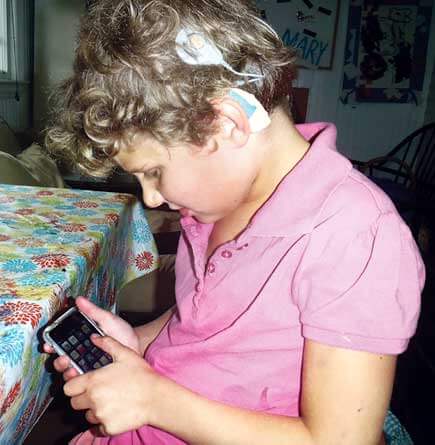As the world becomes increasingly dependent on technology for day-to-day living, it is only logical that educators and parents are using computers and handheld devices to teach children. Enter a mother who aims to use technology specifically to help teach children with special needs.
Last year Margaret Ellis, a mother of two who lives in Blacksburg, Va. started her own company and created four different types of Apple iTunes applications, which include interactive books and a communication program that translates words into different languages, including sign language.
The company, called DevelopEase, is focused on using technology to help children with disabilities overcome the challenges of learning. Ellis has firsthand knowledge about the usefulness of the applications from raising her daughter, Mary, who has disabilities resulting from a brain infection. In Aug. 2009 Mary, who is deaf and can barely communicate through speech and sign language, started using the iPod apps, which aid her verbal communication skills, giving her a sense of achievement, self-confidence and independence.
“Mary doesn’t need a lot of assistance to interact with the apps,” says Ellis. “If you get into an app and you make a mistake, it’s really safe. The usability is really good because you can always press the home screen and go back and start over. She has a lot of success with it. Whereas, if you’ve experienced a game on a desktop, it’s like you have to arrow out and arrow out and arrow out and you get in somewhere that you didn’t mean to go and it’s likely that she would enter into the wrong zone and then give up.”
Anyone who owns an iPhone, iPad or iPod touch can use DevelopEase’s software, which can be purchased through Apple’s App Store or iTunes. Ellis was amazed by the global response she received when she first marketed her product on the online store.
“There’s people actually all over the world who are buying DevelopEase’s apps. I can’t see who has bought them, but I can see … somebody just bought my app in Israel or in England or in Japan. I’ve even seen someone in Australia purchase one.”
Although DevelopEase software is geared toward special needs children, any child can use it. At Mary’s elementary school, the software has proven useful, since children with special needs are in classrooms with children who don’t have disabilities. In the fall of 2009, her school, Kips Elementary School in Blacksburg, was the first school to use iPods with DevelopEase apps.
With both a B.S. in Mathematics Education and an M.S. in Computer Science from Virginia Tech, Ellis has the technological expertise to develop the apps. She also taught computer science in high school, an experience that has allowed her to creatively design software programs that teach students with a wide range of aptitudes.
“My concept is technology for differentiation. People say now more ‘UDL’ (universal design learning) and that’s saying we should have a classroom that truly represents our community,” she explained. “We should use approaches that reach all different children. There are three demographics within those classrooms that we can especially reach with technology — which are children with special needs, children who speak English as a second language and children who are gifted — because they are going to stand out as needing some extra services.”
Not only does DevelopEase create the applications, but the company also visits the classrooms and assists teachers with installing their software on iPods and implementing them into students’ curriculums.
“We go to the school and tell them how we can help them,” explains Ellis. “Then we help the teachers set-up their accounts and the iPods. Then they’ll manage them and it’s a school account.”
To teach educators and families how to use Apple’s different handheld devices, DevelopEase offers workshops that explain equipment and custom software installation.
“The bulk of DevelopEase’s work is really providing workshops and training for schools,” Ellis says. “A lot of school systems have purchased iPods or they know that they’re useful, but then the reality of the classroom teacher, of the special teacher or of the technology resource teacher, is that it’s a lot of work to get them set-up for a whole class of students to use. We essentially serve as a consultant to the schools.”
DevelopEase also designs case management websites where school professionals, doctors, families and other caregivers can access information about a child’s developmental growth. To ensure that the information on the website is kept confidential, the company provides a password to all its users. DevelopEase can also update information on the website or train the customer to post news to the site.
Ellis observed that the portable devices seldom break in the hands of the students. One of her long-term goals is to make iPod training more accessible to communities so more people are aware of its usefulness in teaching special needs children. Currently, she lacks the funding to financially back her vision. She hopes, however, that schools will be able to receive grants and partner with her to support her research activity.
As for the future, Ellis sees the possibility of her business expanding nationally. If more people contact DevelopEase for business proposals, she envisions herself traveling more often to implement software, provide workshops to customers and create more customized applications for specific client needs.
Describing the teaching potential of iPods, Ellis believes these portable devices will profoundly change the way children learn.
“For a long time, programmers like myself, we would work on software programs, but it’s not like you could walk down the street and have it make a difference to a family. Now you know it can. It’s a real revolution in computing.”
Margaret Ellis can be contacted by e-mail at support@developease.com or by phone at (540) 552-2232. For more about DevelopEase, visit www.developease.com.
















